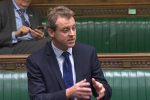Joe Robertson, Member of Parliament for Isle of Wight East, secured a Westminster Hall Debate on the Impact of the rise in National Insurance Contributions on Charities. Within the debate Joe spoke out against the Government's Autumn Budget which announced significant changes to Employer National Insurance Contributions (NICs) effective April 1 2025. These changes will have a disproportionate and potentially devastating impact on charities, particularly charitable social care providers, which are not exempt from these increases.
Joe criticised the Government for not extending the NIC rate relief or exemptions to charities, particularly those delivering essential services like social care, homelessness support, and disability services. Joe urged the Government to implement targeted relief, as without urgent intervention, the cumulative impact of these changes risks eroding the foundation of the UK's charity sector, leaving vulnerable communities underserved and critical services dismantled. There will be huge sector impacts for not only hospices, but homeless, social care and women's charities, with Women's Aid raising significant concerns that the NICs increase will negate 80-100% of Gift aid.
Joe Robertson quoted Sarah Elliott, CEO of NCVO: "This is the biggest shock to the sector since the pandemic. Charities already juggling rising demand, escalating costs, and falling funding cannot absorb an additional £1.4bn in costs without drastic service cuts. Charities across the country are already in a dire situation, juggling a triple threat of rising demand, escalating costs, and falling funding. This additional cost, for which there is no headroom in budgets to cover, will be devastating."
Joe applauded charities within the local community including Aspire Ryde, Age UK, Community Action IW and Mountbatten Hospice for their continued hard work despite the lack of support by the Labour Government. Not only do charities deliver almost £17bn worth of public services every year, but many also provide support when public services fall short - without receiving any public funding at all.



